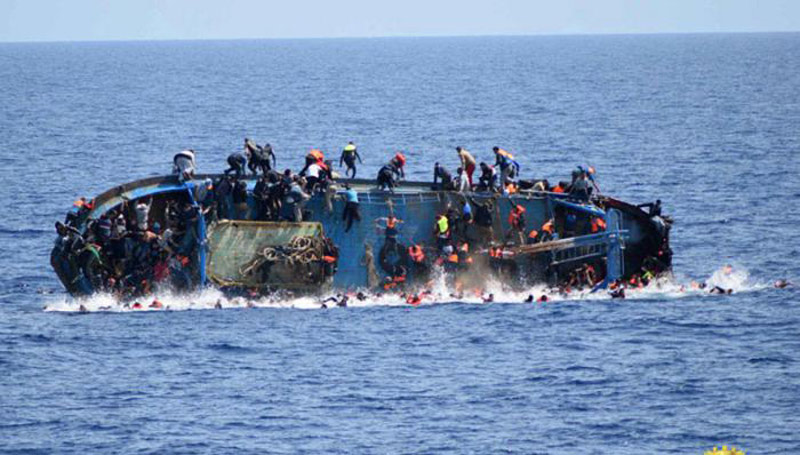When Risking Life is all Life Offers
- Written by Elson Concepción Pérez
- Published in Opinion
- Hits: 2954
 Photo: El País
Photo: El País They do not want to die, but the reality is that it’s the same if the choice is drowning in the Mediterranean when trying to cross in a fragile boat, or suffering the fate of their compatriots facing hunger, disease, and the crossfire of rival bands or terrorists financed from abroad.
From Eritrea, Ethiopia, Tanzania, Syria, Sudan, Nigeria, Somalia, Gambia… they come, heading to Europe, to the former colonial powers that plundered their countries.
How to reach the continent is more uncertain. Exposed to Mediterranean crossings crowded into vessels of all kinds, they pay sums that range from 3,000 to 8,000 euros. Migrants must sell everything they have, if they have anything, or offer themselves as modern day slaves, subjected to various forms of abuse.
Hundreds of thousands arrive, but thousands do not reach their desired destination; they perish drowning or attacked by sharks in the vast graveyard that the Mediterranean has become. The exact number is not known.
This description is only part of the reality, which includes the refusal of some European countries to accept them, the inhospitable camps where they are taken, deportations, imprisonment, walls topped with barbed wire along borders to prevent their moving from one nation to another. Not to mention, racism and xenophobia that continue within a capitalist social system based on exploitation.
Libya, a North African country that has become ungovernable, is used as the launching point for migrants looking to reach Europe. There, the International Organization for Migration warns of “the purchasing of many immigrants as if they were veritable slaves,” in the 21st century; but now with dollars and euros used by the trafficking mafias operating with impunity in the nation.
The issue was addressed during the recent Brussels Summit, where disagreement between countries in southern Europe and those to the center and north has created a major rupture within the European Union. Italy and Greece feel alone as they face the arrival of thousands of immigrants from Africa and the Middle East, while nations in the north and center of the continent accuse them of failing to police their Mediterranean coastlines.
Jean Claude Juncker, president of the European Commission, commented on the issue, stressing “the fragility of the European Union is increasing – cracks are growing in size, we need to find a consistent response now to the migration crisis.”
This was evident when, during the Summit, it was agreed that all members would help rescued migrants, but no details were established as to who would do so, or how. Similarly, all agreed on the creation of “secure migration centers,” where those seeking asylum for “genuine” reasons would be identified, and irregular migrants housed until they were returned to their countries of origin.
The accord, however, does not clarify in which states these centers will be located. And more controversial is the lack of any explanation as to how a “secure center” is defined, leading many to fear the proliferation of prison camps for immigrants who reach Europe, according to BBC Mundo.
An approach that is more than a little late is the idea presented by some European leaders of promoting greater investment in Africa, to help the continent achieve substantive socio-economic change, so people do not leave their countries in search of a better life.
We can only hope that the adage “better late than never” holds true, and that African nations receive foreign investment and other forms of collaboration to at least reduce hunger and disease. May the chilling UNICEF figures be taken into consideration, like those indicating that every day, across the continent, 2,600 babies die in the first 24 hours of their lives.
Ethiopia and Tanzania top the list of the world’s countries with the highest neonatal mortality rates.
To date, the many summits on the migration issue have yet to show positive results.
As long as the focus remains on palliative measures, and the root of the problem is ignored, migration will continue to be a nightmare for Europe. Or more accurately, as long as the debt owed Africa and colonized countries for centuries of exploitation is not paid, these so-called solutions will be no more than band-aids and mercurochrome for a deep wound.
According to official data, more than 65.6 million persons around the world have been obliged to abandon their homes because of internal conflicts and precarious living conditions. Of this total, some 22.5 million are refugees, with half of these being under 18 years of age.
Solving the equation does not require much mathematical knowledge, or that of any other kind. Underway is massive emigration from impoverished countries, whose resources have been plundered and where infant mortality is measured in double digits. In many of these, governmental chaos, internecine conflicts, religious discord, and the lack of investment to overcome underdevelopment are constants in everyday life - with no future in sight.
Millions take their chances at sea, to seek a different destiny, so life has some meaning. / Granma
